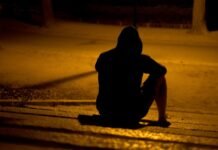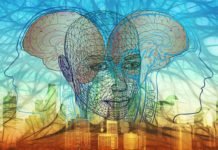In this pandemic of COVID-19, the whole world is suffering a lot. The disease which originated from the city of Wuhan, China is at the verge of destroying the whole world. Scientists from all over the world are engaged in developing the vaccine, yet no positive results have been found. The only way to prevent this disease is social distancing and therefore, for this reason countries around the world are forced to impose lockdown and curfews. In long lockdown period, our elders are facing many psychological troubles. At this stage they already struggle with various physical ailments and this social distancing are adding up more psychological problems for them. Due to their weak immunity at this age they have been advised to take extra care and follow strictly the rules of social distancing. This is leading to various mental illnesses like stress disorders, anxiety disorders and depression etc. Many studies support that an increasing number of geriatric people are living alone and are at risk of being socially isolated (Victor et al. 2002, Savikko et al. 2005, Sundstrom et al. 2009). Through this paper, an attempt has been made to explain how social distancing creates psychological illnesses and what measures should be taken to ensure that this social distancing does not become a social isolation for the elders and they can live with a hope and positivity.
Corona Virus officially designated as COVID-19 by World health Organization (WHO) has now reached to the level of pandemic affecting every single person across the world till date (26st April 2020). There have been around 28,04,796 confirmed cases 1,93,710 deaths globally. As per Ministry of the Health and Family Welfare, of Indian Government there are 21132 active cases of which 6361 have been successfully discharged and unfortunately 886 people perished due to this pandemic (as on 27st April 2020). In Italy the average mortality age was 80 years who were deceased and from COVID-19, hence it is seen that though majority infections occurs in younger patients, mortality rate is comparatively high for the older patients. The epicenter of COVID-19 (Onder et al. 2020), Wuhan China reported around 72314, deceased cases in which 86.6% patients were patients aged between 30-79. The majority of these patients had some chronic diseases like diabetes, cardiovascular disease or were former smokers. Only 9% of the infected patients were aged 75 and older but almost half of the deaths happened in this group. Though the median age of patients with infection was 48. It shows that mortality rate is much higher in older adults and those with under lying disease. The outbreaks of infectious diseases is also accompanied by psychological distress and symptoms of mental illness (Bao et al. 2020).
As per the advisory published worldwide by World Health Organization, it is clear that the major affected population was having lesser immunity towards diseases. Since old people already lose their immunity power, hence they are highly susceptible to the disease.
As per protective measures and to stop the virus from spreading and going into various stages, countries are starting nationwide lockdown, long curfews and are advising to strictly practice social distancing. All these measures will eventually isolate the elder ones from their loved ones, cut them from the daily routine of social gathering, which is very essential in this age group. They will also be deprived of morning walk with their friends, visit to community centers parks and places of worship like Temple, Church, Gurudwara, Mosque etc. This sudden change in their life style leaves them vulnerable to various mental issues and physical problems too. Many older adults already have physical problems like cardiovascular, autoimmune, neurocognitive and mental health issues. A recent longitudinal mediation analysis published in Lancet a public health Journal, on social disconnections perceived isolation and symptoms of depression and anxiety among older Americans (NSHAP), concludes that social disconnection puts older adults at greater risk of depression and anxiety (Santiniz et al. 2020). Similar results found that due to social distancing strategy especially for older adults with functional emotional and cognitive deficit (Steinma et al. 2020), the anxiety and accompanying emotional distress are known to increase susceptibility to infection (Coughlin et al.2012).
Objective:
This paper has following objectives to:
- Analyze the global psychological impact of COVID-19 on elderly people.
- Examine the impact of social distancing among elder population in this crucial time.
- Point out suggestions for our society and family to overcome this issue.
Methodology of the Research:
This paper has been prepared by the methodology of desk review or reading and analysis of data’s and text. Under this method number of primary and secondary sources have been looked and analyzed.
Impact of Social Distancing and Isolation on Mental Health in Elders
India’s elderly population has grown in relative and absolute terms (Bhat and Dhruvarajan 2001; Prakash 1999), and the United Nations Population Division projects that India’s population ages 50 and older will reach 34 % by 2050 (UN 2001). As per the Census 2011, of India, there are nearly 104 million elderly person (aged 60 year or above) of which 53 million are females and 51 million are males. According to the United Nations Population fund and Help-age India the number of elderly persons is expected to grow to 173 million by 2026. Both the share and size of elderly population is increasing over time. From 5.6% in 1961 the proportion has increased to 8.6% in 2011. This demographic transition has important social, economic, and public health implications. With many ups and downs in life, elders loose financially (due to variousfamiliar responsibilities) due to which they become victims of psychological problems. The community based mental health studies conducted by Nandi et al. in India have brought to light that point prevalence of depression in geriatric Indian population varies between 13% and 25%.According to World Health Organization, depression risk is much higher in older adults including genetic susceptibility, chronic disease and disability, pain, frustration and limitations in activities of daily living (ADL), personality traits (dependent, anxious or avoidant), adverse life events (separation, divorce, bereavement, poverty and social isolation) and due to lack of adequate social support. Many other studies have found a relationship between depression and various social as well as financial factors like age, low education, weak financial status, and manual occupation (Martin et al.2009, Shroff 2011, Streeter et al 2012, Ibarra et al 2015). And today due to corona virus pandemic, such a large population is bound to stay in the houses. During this lockdown and social distancing older people face many psychological and social problems like –
- Lack of emotional support.
- Fear and anxiety of loss of spouse and friends.
- Psychological fears generating metabolic disorders like high blood pressure, cardiovascular disease, un- controlled palpitation of heart.
- Feeling useless and unwanted.
- Loss of their social role because of social disconnection from their friends.
Many studies show that larger social networks and social support are associated with improved mental health among older age people. It has been found in several studies and literatures, that the lack of social support and isolation creates many mental health problems. Cornwell & Laumann, 2015 found in a national survey of older adults that participation in social activities promotes better mental health. As a consequence, feelings of isolation and distant social relations has been shown to have implications for the decline in cognition, mood and sensitivity to threat, along with a buildup of cortisol concentrations, worsening immune functioning, sleep disruption and increased bodyweight (Cacioppo et al. 2009). Similar studies support that individual who feels lonely or isolated (having less social support) are likely to develop depression symptoms, due to social isolation many psychosomatic problems are found in old age people (Cacioppo et al. 2002). Many studies support that Social isolation has been consistently found to be associated with coronary artery disease (CAD) (Brummett et al. 2001 (Friedmann et al. 2006), congestive heart failure (Murberg 2004) and hospitalization due to heart failure (Cene et al. 2012).
It is found in various studies that isolation and loneliness are both interdependent risk factors for a range of health outcomes (Shankar et al. 2011, 2013, Coyle and Dugan 2012).
Hence the above listed studies shows that old age people have physical problems like arthritis, diabetes, blood pressure etc. moreover they are dealing psychologically with other financial and emotional issues, of which they share only with their coeval friends. But this sudden lockdown has created a complete disconnection in physical problem sharing. Hence raising the psychological anxiety and depression if this lockdown continues for even longer period, then old age people may get affected with severe mental illness. Thus some concrete steps should be taken in the direction to avoid the same.
Assistance for Mental Problems in Elders-
In this situation of pandemic of COVID-19, social distancing is the key element to defeat it. But we are still unaware as to how long we need to stay in this lockdown maintaining social isolation. Hence family members should be aware of its mental effect on their family elders. In order to control the psychological isolation and illness one can adopt following suggestions for mental wellbeing of our elders-
Let’s Talk to Them-We should periodically talk to them about their feelings and general things related to their needs, which can give them emotional support. Discuss the importance of physical distancing and try minimizing outside travel for their daily needs. Care should be taken to prevent the conversion of social distancing to social isolation as it may have adverse effects on older people. This is the only time to help and talk to them in order to relieve their anxiety and thereby reducing social isolation.
The Power of Religious Faith and Hope-Meditation can be practiced, reading and recitation scriptures, listening to inspirational programmes, reading of motivational literature etc. can also be implemented. Such activities may also enhance mental health, ability to cope up with anxiety and improve physical health resistance to infection. As per research, religious activity nourishes the spirit also (Koenig et al.2020).
Healthy Life with Some Exercise and Yoga- Studies have found a positive relationship between physical exercise and mental health. we all know a healthy mind lives in a healthy body, so one should engage in moderate intensity exercise for 30-45 minutes each day(after being approved by their physician).These are known to improve immune function and potentially reduce risk and severity of respiratory viral infections (Martin et al. 2009). We all know that Yoga and Asanas are very much important for health promotion. Yoga has a great potential to lead people towards greater mental wellbeing. Yoga’s greatest aim is to create compassion within and a deep sense of unity and oneness with all forms of life (Shroff 2011)).Yoga practice may reduce anxiety and depression in person suffering from many health problems also. Many studies on stress management approach not only to reduce emotional negativity but also to reduce the burden of stressed produced diseases (Streeter et al. 2012).
Sleep- the Ultimate Medicine– Daily dose of 7-8 hours of sound sleep can prove to be nectar in this pandemic. In many studies found that, for better immune system and protection against virus, sleep is a great medicine (Martınez et al. 2009, Ibarra et al. 2015). The circadian rhythm should be on track to protect from such deadly infections.
Maintain Weight and Follow Healthy Diet – Studies found that obesity is an enemy and poses risk of virus infections therefore older people should have a proper diet schedule and a healthy way of life style. They should eat healthy and maintain weight (Neidich et al. 2017).
Medicines to Boost their Immunity– Vitamin C and D should be taken in ample amount to ensure increased immunity among elders (Prietl et al. 2013). Many Aayurvedic immunity booster medicines have been recommended by Ayush Mantralaya of Government of India and through Aarogya Setu App which is a very useful App launched by Central Government of India. Other countries can also employ similar measures to boost their immunity.
Getting them Involved in Daily Activities– Indulge them in various household tasks and hobbies so that they stay busy throughout the day. Keep doing small activities at home to reduce boredom. Keeping them busy in daily activities like gardening, cleaning and cooking will help to reduce anxiety. Arrange a medium to buy groceries, medicines and other essentials.
Connecting to their loved Ones-They might be worried at this time about their children and grandchildren, who stay away from them. Connect with them once in a while through phone calls or video call to keep them stress free. They should stay in touch with their physician telephonically at regular interval.
Avoid Media Negativity– With the news in this pandemic everywhere and it is very difficult to filter out reliable news. They should not watch news reports all the time as it may be upsetting and misleading for them. Seek information from reliable sources like government websites ones or twice in a day.
Helping the Needy Person (spreads love and hope)– In all the religions helping the needy is considered as a great act and as a human helping others spreads a message of hope and love. This is the emotion that brings mental peace and happiness and keeps a person healthy. It has to be noted that helping hand should maintained social distancing rules.
Promote Social Engagement (technology can be helpful) – They can be introduced to various social platforms like face book. U-tube, WhatsApp, so that they feel connected with their distant family members and friends. Provide these sources to learn new skills for entertainment. Even a simple phone call creates a great hope to them.
Consult a Psychologist-If required they should be connected telephonically with their health care professional for cognitive behavior therapy. This could be delivered online to decrease loneliness and improve mental wellness. In the era of pandemic, the role of psychologists and psychiatrists has become very important .Today every individual facing this tragedy very badly and is suffering from mental disturbance needs a source of stress boosters to remain financially, physically and psychologically stable. This is why psychologist role is very important in this time.
Conclusion
In today’s era everyone is participating in a race in that case a pandemic like this leading to such social distancing is a great mental shock for us. So, it needs much mental strength to cope up with this situation, which is a big question mark for our elders. This depends on us that how we are supporting them, for an optimist one can think of this lockdown as an angel in disguise. One can never imagine of spending such a quality time with your dear one’s elders for such a long time. Thus, in this time we should get to know each other in a better way and provide all types of mental support and care to our elder ones. Therefore, we can try to follow the above suggested methods to keep them away from mental illness and enjoy this time in the best possible manner.
REFERENCES
- Brummett B.H., Barefoot J.C., Siegler I.C. et al. (2001) Characteristics of socially isolated patients with coronary artery disease who are at elevated risk for mortality. Psychosomatic Medicine 63 (2), 267–272
- Bao, Y., Sun Y., Meng S., Shi J., Lul. 2019- ncovid epidemic: address mental health care to empower society. Lancet.2020;22(395);e37-e38.
- Barua A, Ghosh MK, Kar N, Basilio MA. Socio-demographic factors of geriatric depression. Indian J Psychol Med. 2010; 32: 87–92.
- [PMC free article] [PubMed] [Google Scholar]
- Bhat AK, Dhruvarajan R. Ageing in India: drifting intergenerational relations, challenges and options. Ageing and Society. 2001;21(5):621–640. [Google Scholar]
- Coughlin SS: Anxiety and depression: linkages with viral diseases.
- Public Health Rev 2012; 34:7
- Cornwell B, Laumann EO.The health benefits of network growth: new evidence from a national survey of older adults. Soc Sci Med 2015:125:94-106.
- Cacioppo JT, Hawkley I.C.,Perceived social isolation and cognition. Trends Cogn Sci 2009:13:447-54.
- Cacioppo JT, Hawkley I.C.,Crawford IE et al. Loneliness and Health:Potential Mechanisms. Psychosom Med 2002:64:407-17
- Cene C.W., Loehr L., Lin F.C., Hammond W.P., Foraker R.E., Rose K. et al. (2012) Social isolation, vital exhaustion, and incident heart failure: findings from the Atherosclerosis Risk in Communities Study. European Journal of Heart Failure 14 (7), 748–753.
- Coyle C.E. & Dugan E. (2012) Social isolation, loneliness and health among older adults. Journal of Aging and Health 24 (8), 1346–1363.
- Friedmann E., Thomas S.A., Liu F., Morton P.G., Chapa D., Gottlieb S.S. et al. (2006) Relationship of depression, anxiety, and social isolation to chronic heart failure outpatient mortality. American Heart Journal 152 (5), 940–948
- Government of India. 2011. Situation analysis of the elderly in India. New Delhi: Central Statistics Office: Ministry of Statistics & Programme Implementation.
- https://wwwstatistacom/statistics/1109867/coronavirus-death-rates-by-age-new-york-city/.
- Ibarra-Coronado EG, Pantale_on-Martınez AM, Velazqu_ez-Moctezuma J, et al: The bidirectional relationship between sleep and immunity against infections. J Immunol Res 2015: 678164; doi:10.1155/2015/678164
- Kim JM, Shin IS, Yoon JS, Stewart R. Prevalence and correlates of late-life depression compared between urban and rural populations in Korea. Int J Geriatr Psychiatry. 2002;17:409–15. [PubMed] [Google Scholar]
- Koenig HG, Smiley M, Gonzales J: Religion, Health, and Aging. Westport, CT: Greenwood Press, 1988
- Murberg T.A. (2004) Long-term effect of social relationships on mortality in patients with congestive heart failure. International Journal of Psychiatry in Medicine 34 (3), 207–217.
- Murata C, Kondo K, Hirai H, Ichida Y, Ojima T. Association between depression and socio-economic status among community-dwelling elderly in Japan: The Aichi Gerontological Evaluation Study (AGES) Health Place. 2008; 14:406–14.
- [PubMed] [Google Scholar]
- Martin SA, Pence BD, Woods JA: Exercise and respiratory tract viral infections. Exerc Sport Sci Rev 2009; 37:157–164
- Nandi DN, Ajmany S, Ganguli H, Banerjee G, Boral GC, Ghosh A,et al. The incidence of mental disorders in one year in a rural community in West Bengal. Indian J Psychiatry.1976:18:79-87.
- Neidich SD, Green WD, Rebeles J, et al: Increased risk of influenza among vaccinated adults who are obese. Int’l J Obesity 2017; 41:1324–1330
- Onder G, Rezza G, Brusaferro S. case fatality rate and characteristics of patients dying in relation to COVID-19, in Italy.JAMA 2020
- Prietl B, Treiber G, Pieber TR, et al: Vitamin D and immune function. Nutrients 2013; 5:2502–2521
- Shroff F(2011) Conceptualizing holism in international interdisciplinary critical perspective: Towards a framework for understanding holistic health. Soc Theory Health9:244-255
- Streeter CC, Gerbarg PL, Saper RB,Ciraulo DA, Brown RP(2012) Effect of yoga on the autonomic nervous system, Med Hypothese78:571-579.
- Santiniz z., Jose P., Cornwell E.,et al, Social disconnectedness, perceived isolation and symptoms of depression and anxiety among older Americans(NSHAP):A longitudinal mediation analysis. Lancet Public Health.2020; 5 : e 62-e 70.
- Steinman MA, Perry L, Perissinotto CM. Meeting the Care Needs of Older Adults Isolated at Home During the COVID-19 Pandemic. JAMA Intern Med 2020.
- Shankar A., McMunn A., Banks J. & Steptoe A. (2011) Loneliness, social isolation, and behavioral and biological health indicators in older adults. Health Psychology 30 (4), 377–385
- Savikko N., Routasalo P., Tilvis R.S., Strandberg T.E. & Pitk€al€a K.H. (2005) Predictors and subjective causes of loneliness in an aged population. Archives of Gerontology and Geriatrics 41 (3), 223–233
- Sundstrom G., Fransson E., Malmberg B. & Davey A. (2009) € Loneliness among older Europeans. European Journal of Ageing 6 (4), 267–275
- The epidemiological characteristics of an outbreak of 2019 novel coronavirus diseases (COVID-19) in China]. Zhonghua Liu Xing Bing Xue Za Zhi 2020;41:145-51.
- United Nations, Department of Economic and Social Affairs, Population Division (2001). World Population Ageing: 1950–2050, 271.
- Victor C., Scambler S., Shah S., Cook D., Harris T., Rink E. et al. (2002) Has loneliness amongst older people increased? An investigation into variations between cohorts. Ageing & Society 22 (5), 585–597.
- World Health Organization. Geneva: World Health Organization; 2001. [Last cited on 2012 Nov 21]. The World Health Report 2001. Mental Health: New Understanding, New Hope[Internet]p.169.Available from: http://www.who.int/whr/2001/en/whr01_en.pdf . [Google Scholar]
- Ministry of health and family welfare, Government of India http://www.mohfw.gov.in
























